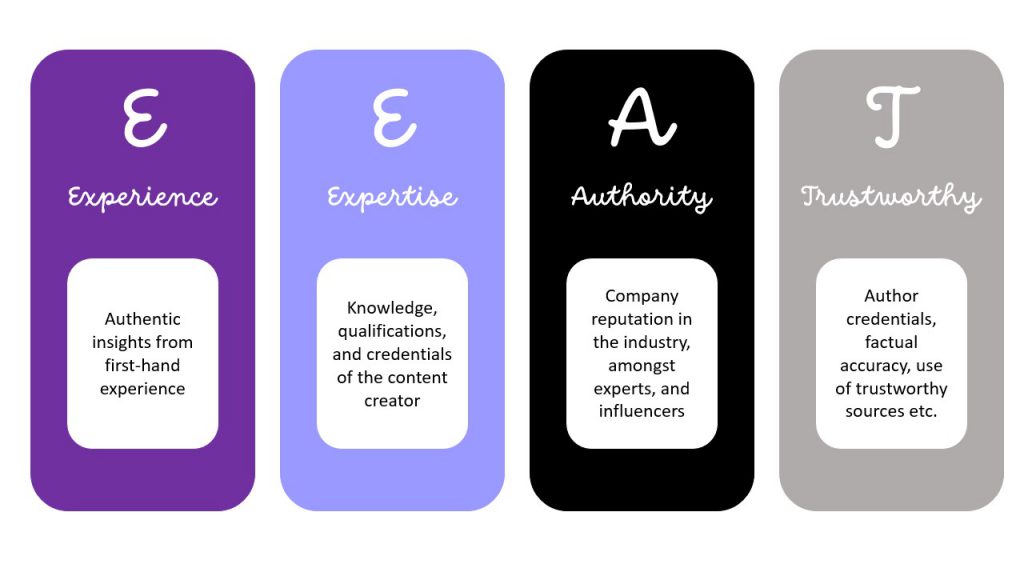We place a huge amount of trust in search engines to deliver accurate results, especially for health and science. But how can we be sure this information is accurate? Or even true? This is where the phrase YMYL comes in. YMYL stands for ‘your money, your life’, a term Google use to ensure only the most accurate and up-to-date results are displayed, allowing users to make well-informed decisions.
But, so what?
Gaining Google’s trust for YMYL content
Gaining Google’s trust as a YMYL website is difficult. So, what does Google look at? Well, my friend, it’s as simple as another acronym E-E-A-T. Experience, expertise, authority, and trustworthiness.
When it comes to YMYL websites, misinformation on these topics can have a huge impact on readers, and therefore, the content needs to have the highest level of E-E-A-T to ensure it is found and trusted on Google. This trust leads to higher rankings, and therefore better performance. So, by creating accurate, engaging, and trustworthy content your site will leave a lasting impact with your audience.

Healthcare SEO starts with knowing your audience
To reach this level, the first thing you need to ask is who’s your target audience? There are several possible audiences, including patients, caregivers, and healthcare professionals (HCPs). However, they all have different content requirements. And I mean vastly different!
- HCPs are more likely to be searching for ‘specific’ information such as dosing and administration, drug-drug interactions, adverse events and safety, clinical guidelines, and up-to-date disease information [1].
- Patients are jumping on their devices to learn about their symptoms and/or diagnosis to better understand their health. The content they find has a huge impact on how they understand, describe, and present their symptoms when talking with their clinicians [2,3].
- Caregivers turn to the web to understand their loved one’s diagnosis and how they can better support their friend or family.
See, vastly different needs! For SEO, it is vital that you write content that meets the needs and wants of YOUR audience. You want them to click away with the confidence they found what they were looking for.
Key factors for SEO of medical websites
Okay, so you have your target audience set, but your fingers are still hovering above the keyboard, unsure of what to write. Here are our top tips for SEO in pharma to help get things right when it comes to developing health and science content:
1. Your website must be findable
To be findable, you need to get into the mind of your audience – think, talk, and write like they would. We can do this by identifying the types of phrases and keywords they use when searching for your content or competitors’ websites. This helps you develop a content strategy that fills the gap in their knowledge and meets their needs. Therefore, they will leave happy and informed, and Google will see that!
2. Your content needs to be readable
‘But Emma, what do you mean by readable?’ Great question, ‘readability’ is dependent on your target audience – a doctor with 20 years’ experience in the field will have greater ‘health literacy’ than a teenager! So, your copy needs to be technically accurate and pitched at the right level.
Writing content targeted at patients? Well, patients could be anyone. Your mum, my brother, the boss’ neighbours, or anyone, really. Therefore, your content needs to be written at a level they will understand, no matter their situation or background. This may seem obvious, but evidence shows that most medical information found online is at a readability level not suited for the public [4-6].
But again, so what?
People with low health literacy experience significant barriers to their healthcare, with the information they need simply inaccessible to them. This has a huge impact on their health. The more people know and understand about their health, the greater the chance they will seek out help and make better informed decisions. Ultimately, as Sheldon Cooper (Big Bang Theory) would say, they become “masters of their own bladders”.
3. You must be reliable
It is vital that not only your readers, but Google, sees you as a reliable and trustworthy source. Why? Medical information can truly impact someone’s life, for the better and for the worse! Unfortunately, medical misinformation is just as findable, and sometimes more memorable, then accurate information [7,8].
Okay, but how do I make Google and my audience trust me?
Simple, really, show them you’re an expert in the field, talk from experience, highlight your hard-earned credentials on the webpage, and don’t publish yesterday’s news. Be at the forefront of medical research. Basically, scream from the rooftops – ‘I am awesome, and I know what I am talking about’ and then back it up with the proof.
The value of SEO in pharma
An understanding of both YMYL and E-E-A-T is essential for SEO in healthcare and pharma. Importantly, in an ever-changing digital landscape, SEO remains one of the most viable and cost-effective tools available to help drive consistent traffic to healthcare and medical websites.
However, for healthcare and pharma companies there are several benefits beyond improved traffic to implementing SEO, including brand awareness, building relationships with your target market, and positioning yourself as an authoritative and trustworthy expert for both HCPs and patients.
Ready to elevate your website with SEO?
Our SEO experts have you covered. Click here for more details on our search & digital service.
References
- Hermes-DeSantis ER, et al. J Med Internet Res. 2021;23(6): e25868.
- Finney Rutten LJ, et al. Public Health Rep. 2019;134(6):617–625.
- Rochford B, et al. JMIR Ment Health. 2023;10:e43253.
- Daraz L, et al. Am J Med Qual. 2018;33(5):487-492.
- Pook CJ, et al. J Clin Urol. 2022;15(5):429-433.
- Rughani G, et al. Br J Gen Pract. 2021;71(706):e391–e398.
- Cai HC, et al. Curr Dev Nutr. 2021;5(2):nzab002.
- Wolfe CR, et al. Behav Res Methods. 2023;55(1):348–363.
